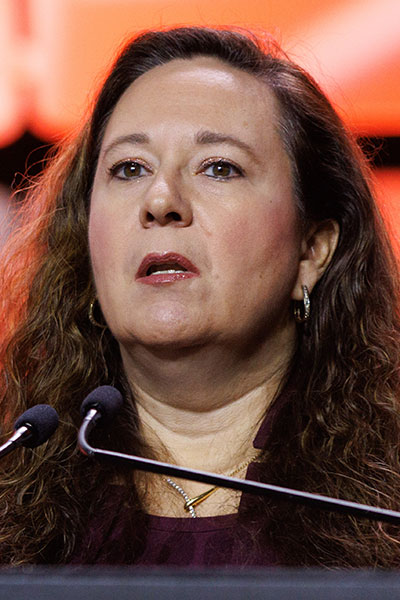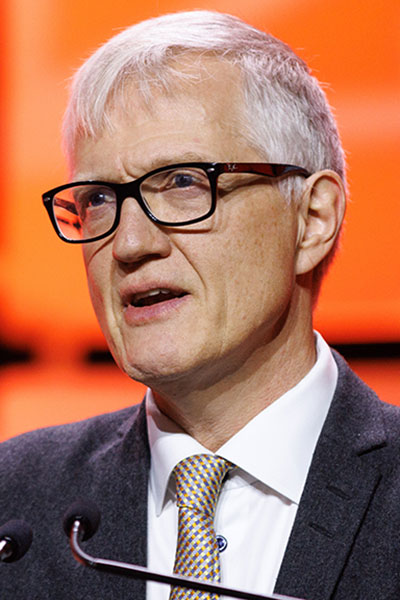Among the abstracts presented during General Session 4 at SABCS on Friday morning, investigators shared findings from studies looking at breast-conserving therapy and local recurrence, the use of genetic profiling to identify patients who can safely omit radiation therapy after breast-conserving surgery, and short-term recurrence rates in patients who pause endocrine therapy to pursue pregnancy.

GS4-01: Impact of Breast Conservation Therapy on Local Recurrence in Patients with Multiple Ipsilateral Breast Cancer – Results from ACOSOG Z11102 (Alliance)
Judy C. Boughey, MD, the W.H. Odell Professor of Individualized Medicine and Chair of the Division of Breast and Melanoma Surgical Oncology at the Mayo Clinic, reported results from the ACOSOG Z11102 (Alliance) prospective phase II clinical trial showing that patients with multiple tumors in the same breast who underwent a lumpectomy followed by radiation therapy had local recurrence rates comparable to those historically observed in patients with a single tumor.
The trial enrolled women over the age of 40 who had two or three sites of breast cancer in the same breast that were separated by normal breast tissue. All patients had undergone mammogram and/or ultrasound, and most had undergone breast MRI as well. Fourteen of the enrolled patients converted to mastectomy due to persistent positive margins, which precluded breast-conserving therapy. The remaining patients were treated with lumpectomy and subsequent whole breast radiation therapy with radiation boosts to all lumpectomy sites. The primary endpoint was local recurrence at five years after the completion of radiation.
Among the 204 evaluable patients, six patients developed local recurrence after a median follow-up of 66.4 months, for a five-year local recurrence rate of 3.1%. This rate was similar to the local recurrence rates seen in prior studies for patients with a single breast tumor who underwent breast-conserving therapy, Dr. Boughey said.
The rate of local recurrence was greater among the 15 patients who did not undergo a pre-surgical breast MRI compared with the 189 patients who underwent this imaging (22.6% vs. 1.7%). Boughey noted that this may have been due to greater detection of disease sites prior to surgery in patients who underwent breast MRI, potentially allowing for more thorough resection. The risk of local recurrence was not associated with patient age, number of breast lesions, tumor biology, or pathologic staging categories.
No patients developed regional recurrence; however, Dr. Boughey reported that four patients developed distant recurrence, six patients developed breast cancer in the opposite breast, three patients developed new non-breast primary tumors, and eight patients died (including one death related to breast cancer).
“The Z11102 clinical trial demonstrates that for women with MIBC breast-conserving surgery with adjuvant radiation with lumpectomy site boosts has an acceptably low local recurrence rate (3.1% at 5 years),” she said. “Breast-conserving therapy for multiple ipsilateral breast cancer is a reasonable consideration for women with two to three ipsilateral foci.”
Additionally, Dr. Boughey said their findings suggest that patients with two or more cancers in the breast who are considering breast conservation may benefit from breast MRI to evaluate for extent of disease, candidacy for breast conservation, and to rule out additional lesions.

GS4-03: Validation of Profile for the Omission of Local Adjuvant Radiotherapy (POLAR) in a meta-analysis of three randomized controlled trials of breast conserving surgery +/- radiotherapy
Per Karlsson, MD, Professor of Oncology at the Sahlgrenska Comprehensive Cancer Center and the University of Gothenburg in Sweden, presented findings from a study showing that patients with invasive breast cancer who had low scores on an investigational gene molecular signature had similar rates of local recurrence whether or not they received adjuvant radiation therapy after breast-conserving surgery.
In this study, Dr. Karlsson and colleagues evaluated the predictive potential of POLAR (Profile for the Omission of Local Adjuvant Radiotherapy), an investigational 16-gene molecular signature that was developed based on gene expression differences between patients with and without local recurrence after breast-conserving surgery. Genes included in the signature have known roles in cellular proliferation and the immune response.
The researchers performed a meta-analysis of 623 patients with lymph node-negative, estrogen receptor-positive, HER2-negative breast cancer who were enrolled in one of three randomized clinical trials examining the efficacy of breast-conserving surgery with and without local breast radiation therapy. The clinical trials included in the meta-analysis were the Swedish SweBCG91RT trial, the Scottish Conservation Trial (SCT), and a trial from the Princess Margaret Hospital (PMH) in Canada. Among the 623 patients in the meta-analysis, 354 were from SweBCG91RT, 137 from SCT, and 132 from the PMH trial.
To evaluate the predictive capability of POLAR, the researchers analyzed gene expression in patient breast tumor samples to assign each patient a POLAR score; they then examined the impact of radiation therapy for patients with high and low POLAR scores. Among the 429 patients with high POLAR scores, those who received adjuvant radiation therapy after breast-conserving surgery had a 63% reduction of local recurrence compared with those who did not receive adjuvant radiation therapy, suggesting that adjuvant radiation therapy was beneficial for these patients.
In contrast, Dr. Karlsson reported that, for the 194 patients with low POLAR scores, there was no significant difference in local recurrence rate between those who received adjuvant radiation therapy and those who did not. After 10 years, 5% of patients who received radiation therapy experienced a local recurrence, compared with 7% of those who did not receive radiation therapy.
“To our knowledge, POLAR is the first genomic classifier that is not only prognostic for locoregional recurrence but also predictive of radiotherapy benefit, showing a significant interaction between RT and the classifier,” Dr. Karlsson said. “While patients with a high POLAR score benefit from radiotherapy, patients with a low score do not, and may therefore be candidates for omission of radiotherapy after breast conserving surgery. These important retrospective findings warrant further investigation, including in contemporary clinical studies.”

GS4-09: Pregnancy Outcome and Safety of Interrupting Therapy for women with endocrine responsIVE breast cancer: Primary Results from the POSITIVE Trial (IBCSG 48-14 / BIG 8-13)
Ann Partridge, MD, MPH, Vice Chair of Medical Oncology at Dana-Farber Cancer Institute and Professor of Medicine at Harvard Medical School, shared results from the POSITIVE clinical trial showing that breast cancer patients who paused their endocrine therapy to try to get pregnant experienced short-term rates of breast cancer recurrence similar to women who did not pause therapy for pregnancy, and many went on to conceive and deliver healthy babies.
To examine the impact of pausing endocrine therapy to pursue pregnancy, researchers designed the single-arm POSITIVE clinical trial (Pregnancy Outcome and Safety of Interrupting Therapy for Women with Endocrine Responsive Breast Cancer). From December 2014 through December 2019, 518 women aged 42 or younger who desired to become pregnant enrolled in the study, opting to pause endocrine therapy for approximately two years to try to get pregnant. Before pausing their treatment, women had completed between 18 and 30 months of adjuvant endocrine therapy.
The study enrolled patients from 116 centers across 20 countries; 23% from North America, 61% from Europe and 16% from Asia/Pacific and Middle East nations. A data safety monitoring committee conducted three interim safety analyses. If more than 46 breast cancer recurrences occurred within approximately three years of average follow-up, the trial would have been suspended. That threshold was not reached.
At a median follow-up of 41 months, 44 participants had experienced a recurrence of breast cancer. The three-year rate of recurrence was 8.9%, similar to the 9.2% rate in an external control cohort from the SOFT/TEXT trials, which examined adjuvant endocrine therapy in premenopausal women.
Trial participants were strongly recommended to resume endocrine therapy after a pregnancy attempt or success. To date, 76.3% have resumed their therapy.
“The POSITIVE Trial provides important data to support young women with HR-positive early breast cancer who are interested in a pregnancy and taking a break from endocrine therapy to pursue one,” said Dr. Partridge. “These data stress the need to incorporate patient-centered reproductive health care in the treatment and follow-up of young women with breast cancer.”
On-Demand Session Availability
Daily sessions will be available for on-demand viewing 3-5 days following the 2022 Symposium (author permitting). They will be available exclusively to registered SABCS attendees until March 2023. Following March 2023, they will be available on SABCS.org under the “Resources” tab.

